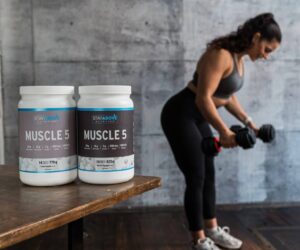

In today’s world, physical fitness has become an important aspect of many people’s lives. High-intensity workouts have gained popularity due to their effectiveness in achieving fitness goals in a shorter amount of time. However, your nutrition can make or break your performance and recovery, so you want to fuel your body with the right macro nutrients and supplements before, during and after your workout.
Here are some tips on what to eat and drink for a high intensity workout, based on the latest research and recommendations from experts.
You want to eat a meal or snack that contains complex carbohydrates, moderate protein and low fat about 2-3 hours before your workout. Carbohydrates are your main source of energy and they will help you sustain your intensity and endurance during your workout. Protein will help you preserve and build muscle mass, while fat will slow down digestion and may cause stomach discomfort.
Some examples of good pre-workout foods are:
You also want to hydrate with water before your workout, as dehydration can impair your performance and increase your risk of heat illness. Aim for about 500mL (16 ounces) of water 2 hours before your workout, and another 250 mL (8 ounces) 15 minutes before.
Supplements can provide additional benefits to support your high-intensity workout. Here are some evidence-based supplements to consider:
Protein powders are a convenient way to increase protein intake and support muscle growth and recovery. Whey protein is the most popular and easily digestible form of protein powder. Studies have shown that protein supplementation can improve muscle growth and recovery after exercise.
Creatine is a naturally occurring compound in the body that can enhance muscle strength and power during high-intensity workouts. Creatine supplementation can help increase muscle mass and improve athletic performance. It is especially beneficial for short-term, high-intensity exercises such as weightlifting and sprinting.
Vitamin D is essential for bone health and muscle function. Many people do not get enough vitamin D from sunlight exposure or their diet. Supplementation can help improve performance and recovery during exercise. Studies have shown that vitamin D supplementation can increase muscle strength and reduce the risk of injury.
Calcium is essential for bone health and maintaining adequate levels can prevent injuries and support overall health. Calcium supplementation can help improve bone density, as well as regulating muscle contraction, and nerve transmission. Calcium can help prevent injuries and support your muscles during high intensity workouts.
In summary, there are many options to fuel your high-intensity workout. The key is to develop a routine that matches your preferred type of exercise. Importantly, your body does require a greater amount of macro nutrients, including protein and carbohydrates. Restricting your body of these nutrients can have a determinantal impact on your long-term performance. Luckily there are a lot of products on the market that can fit your routine, and we strongly recommend that you choose a product that is built and backed by science.
If you are not satisfied with your purchase, please contact us at info@stayabovenutrition.ca. We will endeavour to improve your experience with our products.
Check out our FAQ for more information.
We currently ship our products anywhere within Canada. Purchases are typically processed and shipped within 48 hours. Depending on your location, items will arrive within 2-5 business days.
Check out our FAQ for more information.